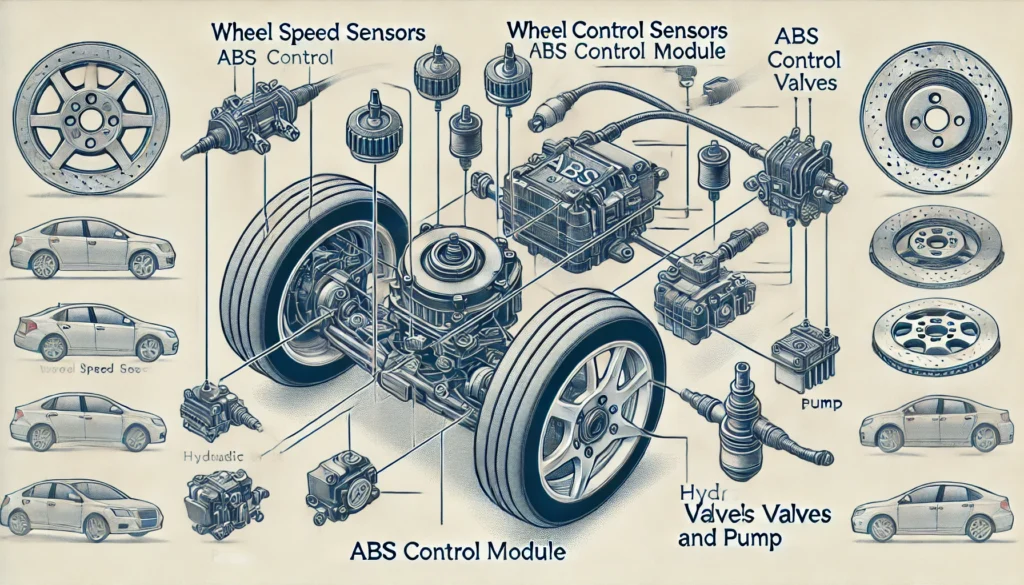The Anti-lock Braking System (ABS) is a critical safety feature in modern vehicles, designed to prevent wheel lockup during braking and maintain steering control. When the ABS system malfunctions, indicated by the ABS warning light on the dashboard, it can have significant long-term effects on vehicle performance and safety. Understanding these impacts can help vehicle owners address ABS issues promptly and maintain optimal vehicle performance.
Understanding the ABS System
The ABS system includes several key components:
- Wheel Speed Sensors: Monitor the speed of each wheel.
- ABS Control Module: Processes data from the wheel speed sensors and controls the hydraulic valves.
- Hydraulic Valves: Regulate brake pressure to prevent wheel lockup.
- Pump: Restores pressure to the hydraulic brakes after the valves release it.

Long-Term Effects of an ABS Fault
- Increased Risk of Accidents:
- Explanation: The primary function of ABS is to prevent wheel lockup during hard braking, allowing the driver to maintain control of the vehicle. Without a functioning ABS, the risk of skidding and losing control increases, especially in adverse conditions such as wet or icy roads.
- Impact: Increased risk of accidents can lead to higher repair costs and insurance premiums, and more importantly, endanger the safety of the driver and passengers.
- Inconsistent Braking Performance:
- Explanation: An ABS fault can lead to uneven brake pressure distribution, resulting in inconsistent braking performance. This can cause one or more wheels to lock up while others do not, making it difficult to stop the vehicle smoothly and safely.
- Impact: Inconsistent braking can cause uneven tire wear, increased stopping distances, and decreased overall vehicle stability.

- Increased Wear and Tear on Brake Components:
- Explanation: Without the ABS system to modulate brake pressure, the brakes may experience increased wear and tear. Components such as brake pads, rotors, and calipers may wear out faster due to the uneven pressure and increased friction.
- Impact: This can lead to higher maintenance costs and more frequent replacements of brake components, reducing the overall lifespan of the braking system.
- Decreased Vehicle Value:
- Explanation: A vehicle with a malfunctioning ABS system may have a lower resale value. Potential buyers may be hesitant to purchase a vehicle with known safety issues, or they may demand a lower price to account for the cost of repairs.
- Impact: Maintaining a functional ABS system is essential for preserving the vehicle’s resale value and ensuring a smooth selling process.
- Driver Confidence and Comfort:
- Explanation: Knowing that the ABS system is malfunctioning can undermine the driver’s confidence and comfort while driving. The driver may feel anxious or stressed, especially in situations that require sudden or hard braking.
- Impact: This can lead to a less enjoyable driving experience and potentially unsafe driving practices due to lack of confidence in the vehicle’s braking ability.
Maintaining ABS Functionality
- Regular Inspections:
- Steps: Regularly inspect the ABS components, including sensors, wiring, and the control module. Address any warning lights or error codes promptly using an OBD-II scanner.
- Importance: Regular inspections help detect and resolve issues before they lead to significant problems.
- Timely Repairs:
- Steps: If any ABS components are found to be faulty, repair or replace them promptly. This includes cleaning or replacing sensors, repairing wiring, and replacing the control module if necessary.
- Importance: Timely repairs ensure that the ABS system continues to function correctly, maintaining vehicle safety and performance.

- Professional Maintenance:
- Steps: Schedule regular maintenance with a professional mechanic who can thoroughly inspect the ABS system and other critical components of the vehicle.
- Importance: Professional maintenance provides an additional layer of assurance that the ABS system is in good working order.
Conclusion
An ABS fault can have significant long-term effects on vehicle performance, safety, and value. Increased risk of accidents, inconsistent braking performance, accelerated wear and tear on brake components, decreased vehicle value, and reduced driver confidence are all potential consequences of a malfunctioning ABS system. Regular inspections, timely repairs, and professional maintenance are essential to prevent ABS system failure and ensure optimal vehicle performance.